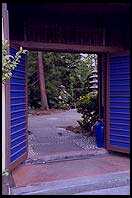Survivorship

PATHWAYS:
Cancer, Caring and Honoring Each Other's Choicesby Molly Sower Sugarman
Don't judge your insides by other people's outsides. That old saw has a corollary: Don't judge other people's insides by your insides. In both, the message is, what appears to be going on with someone is not necessarily what is really happening.
The first warns against feeling "less than" someone because they appear poised, confident, in charge of their lives and problems. Inside they may be feeling as fragmented as you do.
The corollary to this is don't judge other people's decisions by what you would do. When faced with illness, crisis, tragedy or simply buying a new car, everyone is operating on different experience, values and information.
Sometimes, in our efforts to help people dealing with the myriad decisions that surround cancer or other tribulations, we push them to do what worked for us, or criticize them when they don't take "advantage" of procedures we are sure could help.
But most of us are not privy to all that the doctor has told the recipient of our good intentions. Maybe our solution has been considered and rejected; maybe it is flat-out wrong.
More importantly, we don't know what the values are of those who made the decision. For some, any amount of discomfort is worthwhile if it means another month, week, day or even hour of life.
For others, the quality of life is more important than the length. Quality of life can include anything, from being free to travel to eating red meat, butter and lovely, rich desserts. Being tied to one locale in order to be near a hospital or forced to subsist on vegetables may be too high a price to pay for a possible but uncertain extension of life.
These are intimate decisions. No matter what our commonalties - cancer, radiation, metastasis, Gleason scores, age -- our differences are great. No two cancers are exactly alike. Nor are any two people. We, like the illnesses that consume us, respond in unique ways.
Sometimes, the temptation is great to blame the patient who dies from cancer, or even accepts that the battle is lost. He "should have" done this or he "gave up too easily," "if only they'd tried this vitamin therapy or that chemotherapy . . . . " Are we Gods that we can know so surely what another's battle plan should be? Are we so arrogant as to think we can finally evade death? Are we even kind to put such guilt on those left behind?
In a long conversation with a man who has lived with metastasized prostate cancer for nine years, I was told that if my husband had taken hormones in the right manner, if he had made other choices, he would be alive today.
Really!
Just because one man's cancer didn't rage ahead under certain circumstances doesn't mean my husband's would have slowed down or stopped.
But the conversation was enough to intensify my grief with "what ifs," "if onlys," and "did we fail somehow to protect our life together?"
My husband fought his disease vigorously but I think he knew when to stop. He didn't give up but he didn't make the same choices other people might have.
As the cancer grew, so did the light and wisdom of his soul, gained from his confrontation with the facts of his life and death.
In the depth of winter, I finally learned that within me there lay an invincible summer," Albert Camus said. For my husband, that summer bloomed in his relationships with others, in his ability to share his wisdom, to hug and hold his three children, to speak truth without fear, to cry, and to comfort.
Dying isn't a cop-out or a failure. It isn't even a choice, although choices we make may affect when and how we end our journey through life. The thing is, each life is a journey along a different road.
Don't judge the life or death of others by the road you have traveled. They are on a different path, with its own potholes and roadblocks, its own scenery and surprises.
We can waive across the valley between us, point out scenery visible from both sides; we can shout encouragement but we cannot travel - or judge - their route.
Molly Sower Sugarman, author of the brochure" Choices: living with cancer, dying with dignity," writes a column for the Sacremento Bee.



